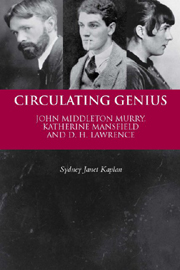Book contents
- Frontmatter
- Contents
- Acknowledgements
- Abbreviations
- Introduction
- 1 ‘My Blundering Way of Learning’: Murry's Still Life
- 2 Still Life and Women in Love
- 3 From Still Life to ‘Bliss’
- 4 ‘A Furious Bliss’
- 5 ‘With Cannonballs for Eyes’
- 6 ‘The Coming Man and Woman’
- 7 The Things We Are
- 8 Circulating Mansfield
- 9 Circulating Lawrence
- 10 Circulating Murry
- Bibliography
- Index
9 - Circulating Lawrence
Published online by Cambridge University Press: 12 September 2012
- Frontmatter
- Contents
- Acknowledgements
- Abbreviations
- Introduction
- 1 ‘My Blundering Way of Learning’: Murry's Still Life
- 2 Still Life and Women in Love
- 3 From Still Life to ‘Bliss’
- 4 ‘A Furious Bliss’
- 5 ‘With Cannonballs for Eyes’
- 6 ‘The Coming Man and Woman’
- 7 The Things We Are
- 8 Circulating Mansfield
- 9 Circulating Lawrence
- 10 Circulating Murry
- Bibliography
- Index
Summary
Mansfield's softening of heart towards Lawrence during the last months of her life allowed for a gradual reconciliation to begin for Murry as well. Apparently, some time in December 1922, Murry wrote to Lawrence in New Mexico, ‘suggesting’ that their ‘relation should be renewed’ (RDHL: 98). He responded, cautiously, on 30 December: ‘Heaven knows what we all are, and how we should feel if we met, now that we are changed. We'll have to meet and see’ (LDHL 4: 364). Lawrence's softening might have been hastened by Murry's positive review of Aaron's Rod in August. Nevertheless, Murry's need for Lawrence had only become acute after Mansfield's death. As it was in 1915, when Lawrence had offered a distraught Murry emotional intimacy to assuage the pain of Mansfield's (temporary) abandonment, so now, in 1923, Lawrence would offer a similar – if more guarded – sympathy to a Murry devastated by his awareness of an abandonment that was final. The letter he received from Lawrence on 2 February 1923 made certain the possibility of genuine reconciliation:
Yes, I always knew a bond in my heart. Feel a fear where the bond is broken now. Feel as if old moorings were breaking all. What is going to happen to us all? Perhaps it is good for Katherine not to have to see the next phase. We will unite up again when I come to England. It has been a savage enough pilgrimage these last four years. Perhaps K. has taken the only way for her. We keep faith – I always feel death only strengthens that, the faith between those who have it. (LDHL 4: 375)
- Type
- Chapter
- Information
- Circulating GeniusJohn Middleton Murry Katherine Mansfield and D. H. Lawrence, pp. 174 - 194Publisher: Edinburgh University PressPrint publication year: 2010



